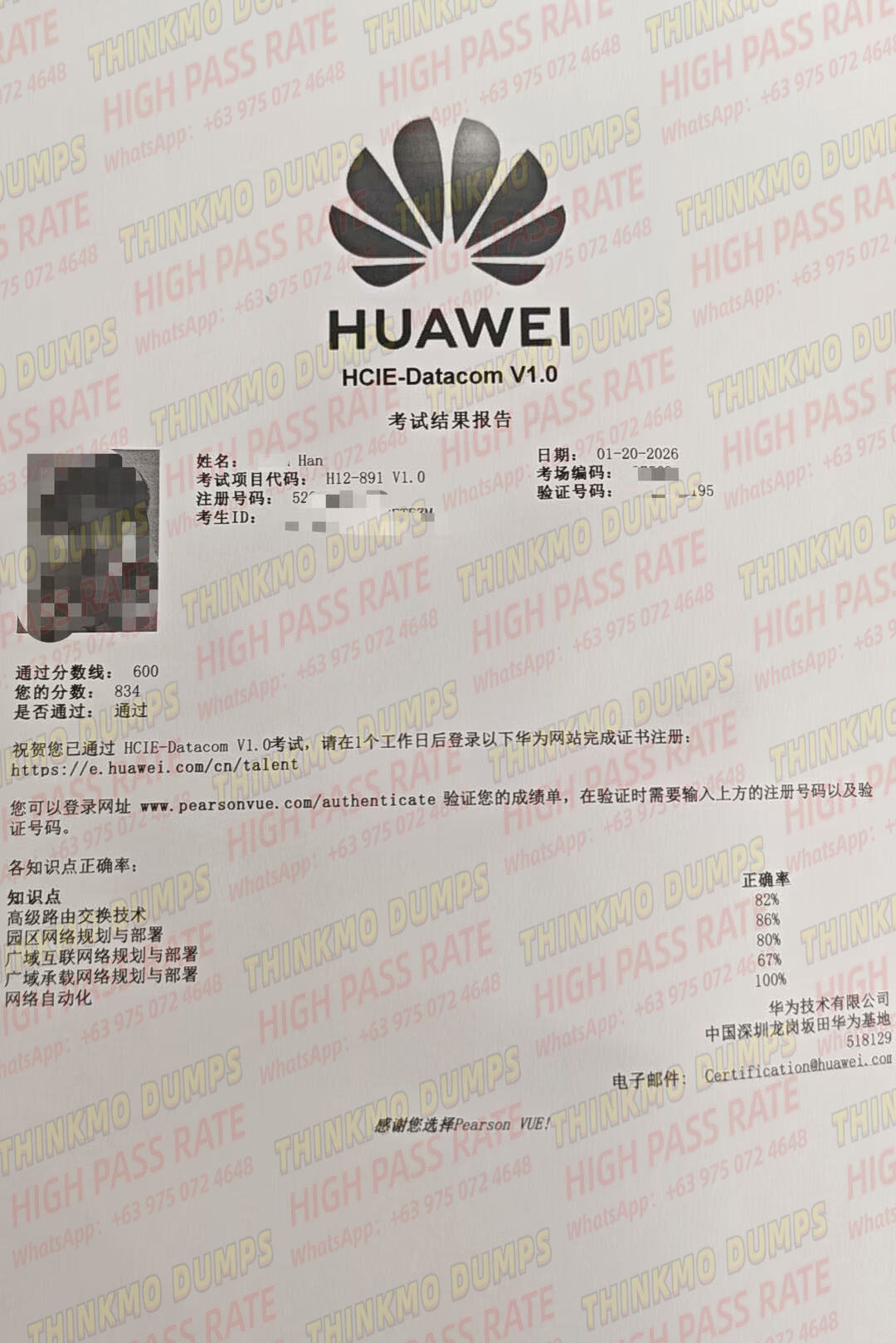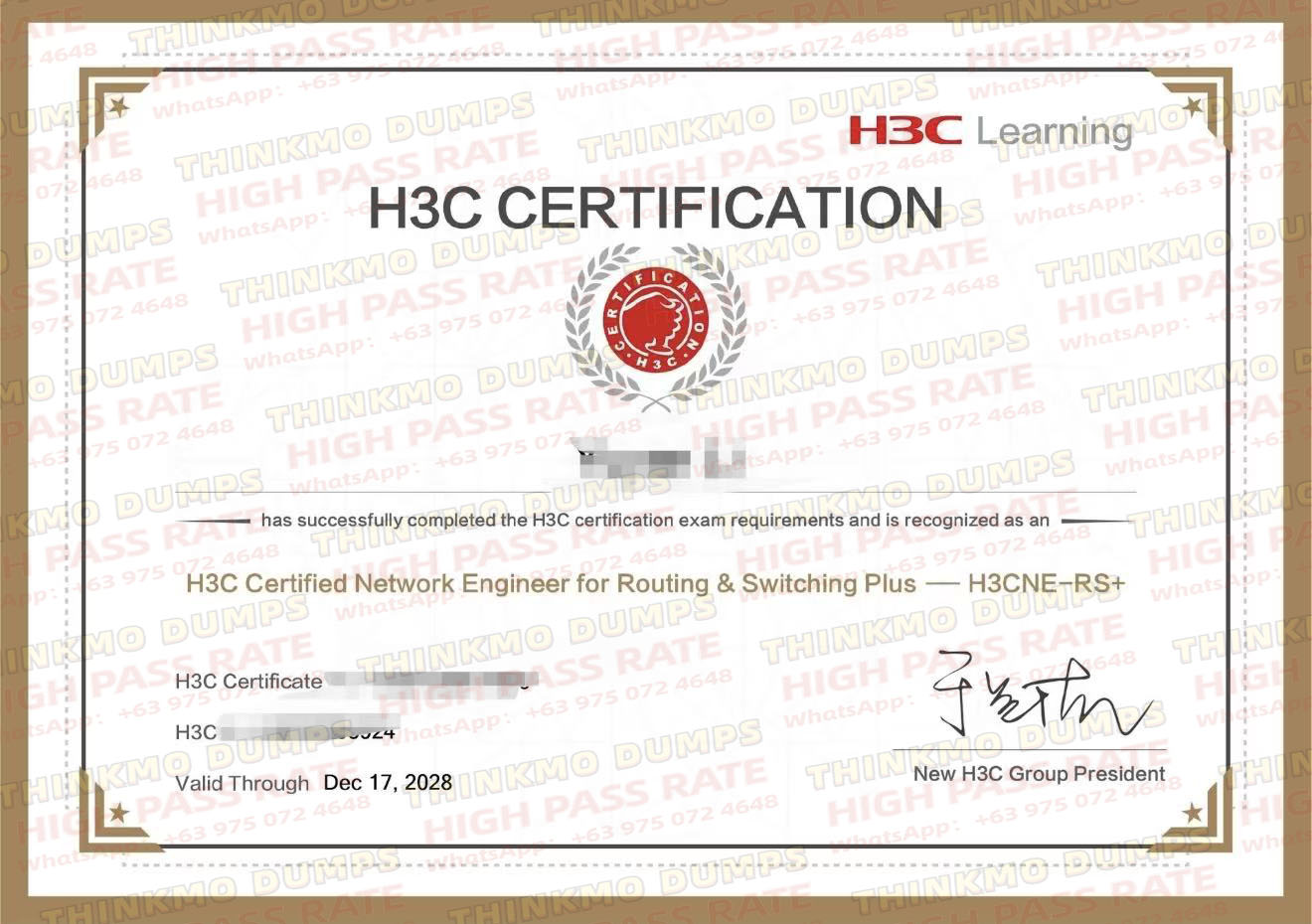What Does the Cisco CCNP Exam Cover?
Update time:2025-09-23
Many professionals who have just passed CCNA often ask: “What exactly do I need to study for the CCNP exam?Is it much harder than CCNA?”
As a seasoned network engineer, let’s break down the CCNP exam content, structure, and preparation logic.
The CCNP (Cisco Certified Network Professional) is the intermediate-level certification in the Cisco certification framework, bridging the foundational CCNA and the advanced CCIE.Its core focus is on testing the ability to deploy, optimize, and troubleshoot enterprise networks.Unlike CCNA, you can’t simply memorize commands to pass — CCNP emphasizes practical problem-solving.

1.Certification Positioning: The Mid-Level Bridge
As Cisco’s intermediate certification, CCNP connects CCNA fundamentals with CCIE depth:
Compared with CCNA: Moves from “basic concepts” to “real-world applications.”The format is 1 Core Exam + 1 Concentration Exam, with scenario-based questions making up about 40%.
Compared with CCIE: No lab, focused on standardized enterprise network operations.Easier than CCIE but closer to daily engineering tasks.
Core goal: Identify engineers who can independently handle daily enterprise network operations and troubleshoot common issues.

2.Exam Content: Core + Concentration
(1)Core Exam (350-401 ENCOR)
Mandatory for all candidates, covering six modules:
Network Architecture (20%): Enterprise layered design, SDN integration with Cisco DNA Center
Advanced Routing (25%): OSPFv3, BGP path selection, EIGRP redistribution
Switching (15%): VLAN, STP/MSTP, link aggregation
Network Security (15%): Firewall zones, IPSec VPN, AAA & RBAC
QoS (10%): Bandwidth assurance, queue management
Automation & Programmability (15%): Python, Ansible, NETCONF/YANG

(2)Concentration Exam (choose 1 of 6)
For example:
Enterprise Routing & Services (300-410 ENARSI): Deep-dive operations & troubleshooting
Wireless (300-425 ENWLSD): Enterprise-level wireless deployment

3.Preparation Strategy: Three Stages
Foundation Review (1–2 weeks)
Review CCNA basics (TCP/IP, routing/switching, network security)
Use simulators like Packet Tracer or GNS3 for hands-on VLAN and OSPF practice
Knowledge Framework (2–3 months)
Study with official Cisco documentation or self-learning platforms
Combine with CCNP exam dumps:
Core Exam practice sets (recent real exam recalls)
Concentration Exam dumps tailored to your chosen track
Focus on understanding scenarios rather than rote memorization of commands
Mock Test & Sprint (1 month)
Drill recent real exam dumps (last 3 months highly recommended)
Take timed mock exams (90 minutes per test)
Analyze mistakes and revisit official docs to fill gaps
4.Common Preparation Mistakes
Only practicing questions without troubleshooting: Scenario-based questions require real troubleshooting logic.
Memorizing commands without context: Understanding use cases matters more.
Ignoring official resources: Always cross-reference Cisco Learning Network and Cisco docs.
Conclusion
The Cisco CCNP exam essentially reflects the daily work of mid-level enterprise network engineers.The challenge isn’t one single topic — it’s about connecting multiple technologies to solve real-world problems.
For anyone serious about advancing in networking, CCNP is more than a certificate — it’s a career stepping stone.Many employers explicitly list “CCNP preferred” for mid-level network engineer positions.Remember: the certification helps, but what truly sets you apart is the problem-solving ability you gain through preparation.
I'm your man who have the 100% valid dumps , buy it now for 50% off to clear your exam!
Click it ↓↓

As a seasoned network engineer, let’s break down the CCNP exam content, structure, and preparation logic.
The CCNP (Cisco Certified Network Professional) is the intermediate-level certification in the Cisco certification framework, bridging the foundational CCNA and the advanced CCIE.Its core focus is on testing the ability to deploy, optimize, and troubleshoot enterprise networks.Unlike CCNA, you can’t simply memorize commands to pass — CCNP emphasizes practical problem-solving.

1.Certification Positioning: The Mid-Level Bridge
As Cisco’s intermediate certification, CCNP connects CCNA fundamentals with CCIE depth:
Compared with CCNA: Moves from “basic concepts” to “real-world applications.”The format is 1 Core Exam + 1 Concentration Exam, with scenario-based questions making up about 40%.
Compared with CCIE: No lab, focused on standardized enterprise network operations.Easier than CCIE but closer to daily engineering tasks.
Core goal: Identify engineers who can independently handle daily enterprise network operations and troubleshoot common issues.
2.Exam Content: Core + Concentration
(1)Core Exam (350-401 ENCOR)
Mandatory for all candidates, covering six modules:
Network Architecture (20%): Enterprise layered design, SDN integration with Cisco DNA Center
Advanced Routing (25%): OSPFv3, BGP path selection, EIGRP redistribution
Switching (15%): VLAN, STP/MSTP, link aggregation
Network Security (15%): Firewall zones, IPSec VPN, AAA & RBAC
QoS (10%): Bandwidth assurance, queue management
Automation & Programmability (15%): Python, Ansible, NETCONF/YANG
(2)Concentration Exam (choose 1 of 6)
For example:
Enterprise Routing & Services (300-410 ENARSI): Deep-dive operations & troubleshooting
Wireless (300-425 ENWLSD): Enterprise-level wireless deployment
3.Preparation Strategy: Three Stages
Instead of investing in training courses, many candidates now focus on dumps and practice exams to improve pass rates.
Foundation Review (1–2 weeks)
Review CCNA basics (TCP/IP, routing/switching, network security)
Use simulators like Packet Tracer or GNS3 for hands-on VLAN and OSPF practice
Knowledge Framework (2–3 months)
Study with official Cisco documentation or self-learning platforms
Combine with CCNP exam dumps:
Core Exam practice sets (recent real exam recalls)
Concentration Exam dumps tailored to your chosen track
Focus on understanding scenarios rather than rote memorization of commands
Mock Test & Sprint (1 month)
Drill recent real exam dumps (last 3 months highly recommended)
Take timed mock exams (90 minutes per test)
Analyze mistakes and revisit official docs to fill gaps
With a structured approach and consistent practice using dumps, your chance of passing increases significantly.
4.Common Preparation Mistakes
Only practicing questions without troubleshooting: Scenario-based questions require real troubleshooting logic.
Memorizing commands without context: Understanding use cases matters more.
Ignoring official resources: Always cross-reference Cisco Learning Network and Cisco docs.
Conclusion
The Cisco CCNP exam essentially reflects the daily work of mid-level enterprise network engineers.The challenge isn’t one single topic — it’s about connecting multiple technologies to solve real-world problems.
By following a structured path — review basics → practice with dumps → take mock exams — most candidates can pass within 3–5 months (with 2 hours daily study).
For anyone serious about advancing in networking, CCNP is more than a certificate — it’s a career stepping stone.Many employers explicitly list “CCNP preferred” for mid-level network engineer positions.Remember: the certification helps, but what truly sets you apart is the problem-solving ability you gain through preparation.
I'm your man who have the 100% valid dumps , buy it now for 50% off to clear your exam!
Click it ↓↓

Hot article
-
 1
1 1. ThinkMo Precise Question Bank: Ace HCIE Written
上传:2026-01-23
-
 2
2 Triple H3CNE/H3CSE Passes | ThinkMo Christmas Succe
上传:2025-12-25
-
 3
3 Success Streak: ThinkMo’s Dec HCIE-Datacom Win
上传:2025-12-24
-
 4
4 ThinkMo Guide: Cisco & Huawei Certification Com
上传:2025-12-22
-
 5
5 Pass CCIE/CKA Exams with ThinkMo’s Top Question B
上传:2025-12-19








